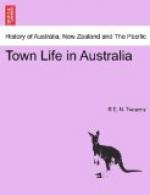The circumstances of a new colony naturally cause additions to the word-stock of the mother country. New occupations and modes of living need new words to describe them, or, as often as not, the settler not being of an inventive disposition, old words are used in a new sense.
The ’bush’—itself an old word used in a new sense—has been most prolific in new phrases. Everyone who lives in the country, whether on a station or in a farm, but not in a township, is called a ‘bushman,’ although properly speaking this designation only applies to a person who lives in the ‘bush’ or unsettled country. ‘Bushranger’ is another word of the same derivation, which it is needless to explain. Of course you know what a ‘squatter’ is. It is strange that the same word which in America is used to denote the lowest class of settlers—the man who settles upon somebody else’s land and pays no rent—is here a synonym for aristocrat. The term ‘farmer’ is applied exclusively to the agriculturist, and a squatter would be very much offended if you called him a sheep-farmer. The squatting class in Australia correspond to the landed gentry of England. The farmer is usually legally known as a ‘selector,’ because under the Land Act he selects a piece of ground perhaps in the middle of the squatter’s leasehold and purchases it on credit for agriculture. A ‘cockatoo’ is a selector who works his piece of land out in two or three years, and having done nothing to improve it, decamps to select in a new district. A ‘run’ is the least improved kind of land used for sheep, but the word is used almost alternatively with ‘station,’ which denotes an improved run. The run may be a mere sheep-walk, but a station is bound to have a house attached to it, and fenced ‘paddocks’ or fields. The storekeeper is the lowest official on a station. Next above him is the ‘boundary-rider,’ whose duty it is to ride round the boundaries of fenced runs, to see that the fence is kept in good order, and that the sheep do not get through it. A ‘stockman’ is naturally the man who drives the stock, and the ‘stockwhip’ a peculiar short-handled long whip with which he drives them. A ‘cabbage-tree’ is an immense sun-protecting hat, rather like the top of a cabbage-tree in shape. It is much affected by bushmen. A ‘billy’ is the tin pot in which the bushman boils his tea; a ‘pannikin,’ the tin bowl out of which he drinks it. A ‘waler’ is a bushman who is ‘on the loaf.’ He ‘humps his drum,’ or ‘swag,’ and starts on the wallaby track;’ i.e., shoulders the bundle containing his worldly belongings, and goes out pleasuring. A ‘shanty,’ originally a low public-house, now denotes any tumble-down hut.




